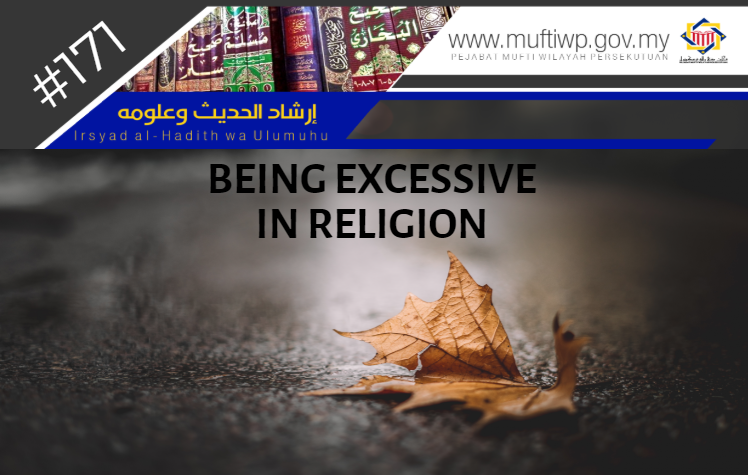
Question:
Is there any hadith related to the restriction of being excessive in understanding the evidences of syarak?
Answer:
Alhamdulillah, praise and thanks to Allah for the countless blessings He has blessed us all with. Blessings and salutations to the Prophet Muhammad PBUH, his wives, his family, companions and all those that follow his teachings to the day of judgement.
Referring to the above question, Islam is a moderate religion that neither burdens its followers, nor does it to be taken lightly. It is one of its beauty compared to other religions which are too restrictive in certain matters.
There are several hadiths that prohibit a person from being an extremist in religion. Among them are:
- From Abdillah bin Mas’ud, the Prophet PBUH said the following three times:
هَلَكَ الْمُتَنَطِّعُونَ
“Ruined, were those who indulged in hair-splitting.”
Sahih Muslim (2670)
Imam al-Nawawi when commenting on the meaning of “الْمُتَنَطِّعُونَ” are those who are too meticulous, excessive and go over the limit in their words and actions. (See al-Minhaj, 220/16)
Moreover, in Sahih al-Bukhari there is a hadith that prohibit the act of making the matters of religion difficult which would only burden himself.
- From Abu Hurairah RA, the Prophet PBUH said:
إِنَّ الدِّينَ يُسْرٌ، وَلَنْ يُشَادَّ الدِّينَ أَحَدٌ إِلَّا غَلَبَهُ
“Religion is very easy and whoever overburdens himself in his religion will not be able to continue in that way.”
Sahih al-Bukhari (39)
Imam Ibn Hajar said that the hadith indicates one of the signs of prophethood. The reason is, when we look upon the people of previous generations, everything that is excessive will surely stop. Furthermore, this does not prevent someone from striving for the perfection in worship for it is a commendable act. The hadith even restricts excessiveness that could lead to exhaustion (and laziness) or excessive in sunnah matters neglecting or leaving the prioritized or obligatory worship. (See Fath al-Bari, 94/1)
Moreover, in Taudhih Usul al-Fiqh ala Manhaj Ahli al-Hadith, there is a maxim used by hadith scholars, which is the 16th maxim that states:
يَجِبُ تَفْسِيْرُ الدَّلِيْلِ وَفَهْمُهُ بِاعْتِدَالِ مِنْ غَيْرِ إِفْرَاطٍ وَلَا تَفْرِيْطٍ
“Evidences in syarak should be understood with moderation without being too restrictive or too lax.” (See Taudhih Usul al-Fiqh, 61)
- Imam Ibn al-Qayyim in his book al-Roh said:
“We should understand what is meant by the Prophet PBUH without being too restrictive or too lax. The same goes in not understanding the words of the Prophet PBUH of what is not meant by the Prophet PBUH and not understanding it vaguely as to what the Prophet PBUH meant from the revelation and explanation. The reason is, if we are careless in this matter, it would lead us towards falsehood and away from the truth of which only Allah SWT knows. Furthermore, misunderstanding the commandments of Allah SWT and His messenger is the root to all bid’ah and falsehood in Islam.” (See al-Roh, 62)
Closing
As a conclusion, moderation and fairness in everything is encouraged in Islam. This is due to the fact that excessiveness or taking things lightly will give a negative effect in religion for anyone who practises it. Before we close this discussion, let us all contemplate on the following hadith:
- From Aisyah RA, she said:
مَا خُيِّرَ رَسُولُ اللهِ صَلَّى اللهُ عَلَيْهِ وَسَلَّمَ بَيْنَ أَمْرَيْنِ، أَحَدُهُمَا أَيْسَرُ مِنَ الْآخَرِ، إِلَّا اخْتَارَ أَيْسَرَهُمَا، مَا لَمْ يَكُنْ إِثْمًا، فَإِنْ كَانَ إِثْمًا، كَانَ أَبْعَدَ النَّاسِ مِنْهُ
“Never did Allah's Messenger (ﷺ) make a choice between two things but adopting the easier one as compared to the difficult one, but his choice for the easier one was only in case it did not involve any sin, but if it involved sin he was the one who was the farthest from it amongst the people.”
Sahih Muslim (2327)
Lastly, may Allah SWT bless us with moderation in performing everything and protect us from excessiveness or taking matters of religion lightly. Amin.
Wallahua’lam.

